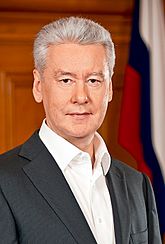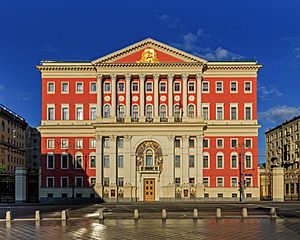Mayor of Moscow facts for kids
Quick facts for kids Mayor of Moscow |
|
|---|---|
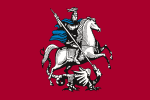
Flag of the City of Moscow
|
|
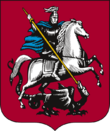
Coat of arms of Moscow
|
|
| Style | His Excellency Mr. Mayor |
| Seat | Moscow City Hall Building |
| Appointer | Popular vote |
| Term length | 5 years |
| Inaugural holder | Gavriil Popov |
| Formation | 12 June 1991 |
| Website | Office of the Mayor |
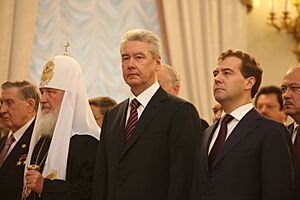
The Mayor of Moscow (Russian: Мэр Москвы, romanized: Mer Moskvy) is the top leader and official of Moscow. This person is in charge of the Government of Moscow, which is the main group that runs the city.
Moscow is special because it is both a city and a separate federal subject (like a state or region) in Russia. Most federal subjects have leaders called governors. But in Moscow, the leader is called the Mayor of the City of Moscow. This is stated in the city's main rulebook, the Charter of the city of Moscow.
Sergei Sobyanin is the current Mayor of Moscow. He was re-elected for a new term in 2018 and again in 2023.
Contents
What the Mayor Does
The Mayor of Moscow leads the Government of Moscow. This means the Mayor's office manages all the city's services. These include things like public property, police, and fire protection. The Mayor also makes sure that all city and state laws are followed in Moscow.
The Mayor's main office is in the Moscow City Hall Building on Tverskaya Street. The Mayor is responsible for all the different districts within Moscow. The Mayor also chooses other important officials. These include deputy mayors and the heads of various city departments.
The Government of Moscow has the largest budget of any region in Russia. This means it has a lot of money to spend on city services and projects.
How the Mayor is Chosen
The Mayor of Moscow was chosen by voters from 1991 to 2004. In 2004, a new law changed this. It meant that the President of Russia and political parties in the State Duma (Russia's parliament) would suggest a candidate. This candidate then had to be approved by the Moscow City Duma (Moscow's local parliament).
After some protests in 2011, the direct election of governors and the Mayor of Moscow was brought back. So, in the 2013 Moscow mayoral election, people voted directly for the Mayor again. This was the first time in 10 years.
To become Mayor, a person must be a citizen of Russia and be over 30 years old. Candidates can be nominated by political parties. They can also run as independent candidates. However, all candidates must pass a "municipal filter." This means they need to collect signatures from local city council members to show they have support.
Latest Election Results
Sergei Sobyanin was re-elected as Mayor in 2023.
| Candidate | Party | Votes | % | ||
|---|---|---|---|---|---|
| Sergey Sobyanin | United Russia | 2,491,327 | 76.85 | ||
| Leonid Zyuganov | Communist Party | 264,644 | 8.16 | ||
| Boris Chernyshov | Liberal Democratic Party | 183,132 | 5.65 | ||
| Vladislav Davankov | New People | 174,286 | 5.38 | ||
| Dmitry Gusev | A Just Russia | 128,306 | 3.96 | ||
| Total | 3,241,695 | 100.00 | |||
| Valid votes | 3,241,695 | 99.40 | |||
| Invalid/blank votes | 19,718 | 0.60 | |||
| Registered voters/turnout | 7,604,055 | 42.89 | |||
|
Official results published by the Moscow City Electoral Commission |
|||||
Mayors of Moscow (1991–Present)
This table shows the people who have been Mayor of Moscow since 1991.
| No. | Election | Mayor | Took office | Left office | Party | Vice Mayor | ||
|---|---|---|---|---|---|---|---|---|
| 17 | 1991 |  |
Gavriil Popov | 12 June 1991 | 6 June 1992 | Democratic Russia | Yury Luzhkov | |
| 18 |  |
Yury Luzhkov | 6 June 1992 | 16 June 1996 | Independent | vacancy | ||
| 1996 | 16 June 1996 | 19 December 1999 | Valery Shantsev (1996–2005) |
|||||
| 1999 | 19 December 1999 | 17 December 2003 | OVR → UR | |||||
| 2003 | 17 December 2003 | 6 July 2007 | United Russia | |||||
| No Direct Election | 6 July 2007 | 28 September 2010 | position abolished | |||||
| — |  |
Vladimir Resin Acting |
28 September 2010 | 21 October 2010 | United Russia | |||
| 19 |  |
Sergei Sobyanin | 21 October 2010 | 5 June 2013 | United Russia | |||
| — | 5 June 2013 | 12 September 2013 | ||||||
| (19) | 2013 | 12 September 2013 | 18 September 2018 | |||||
| 2018 | 18 September 2018 | 18 September 2023 | ||||||
| 2023 | 18 September 2023 | Incumbent | ||||||
Earlier Leaders of Moscow's Government
Before the Mayor's office was created in 1991, Moscow was led by different officials. From 1917 to 1991, the main leaders were called Chairmen of the Executive Committee.
Chairmen of the Executive Committee (1917–1991)
This table lists the Chairmen of the Executive Committee who led Moscow before the Mayor's office was established.
| No. | Portrait | Name | Took office | Left office | Political party |
|---|---|---|---|---|---|
| 1 |  |
Viktor Nogin | September 1917 | November 1917 | Communist Party |
| 2 |  |
Mikhail Pokrovsky | November 1917 | March 1918 | |
| 3 |  |
Pyotr Smidovich | March 1918 | October 1918 | |
| 4 |  |
Lev Kamenev | October 1918 | 16 January 1926 | |
| 5 |  |
Konstantin Ukhanov | 16 January 1926 | 1931 | |
| 6 |  |
Nikolai Bulganin | 1931 | 22 July 1937 | |
| 7 |  |
Ivan Sidorov | 22 July 1937 | 3 November 1938 | |
| 8 |  |
Alexander Yefremov | 3 November 1938 | 14 April 1939 | |
| 9 |  |
Vasily Pronin | 14 April 1939 | 7 December 1944 | |
| 10 |  |
Georgy Popov | 7 December 1944 | 18 January 1950 | |
| 11 |  |
Mikhail Yasnov | 18 January 1950 | 2 February 1956 | |
| 12 |  |
Nikolai Bobrovnikov | 2 February 1956 | 1961 | |
| 13 |  |
Nikolai Dygai | 1961 | 1963 | |
| 14 |  |
Vladimir Promyslov | 1963 | 1986 | |
| 15 |  |
Valery Saykin | 3 January 1986 | 14 April 1990 | |
| 16 |  |
Yury Luzhkov | 26 April 1990 | 2 July 1991 |
See also
 In Spanish: Anexo:Alcaldes de Moscú para niños
In Spanish: Anexo:Alcaldes de Moscú para niños
- Governor of Saint Petersburg
- Governor of Sevastopol (Russia)
- Government of Moscow
- Moscow City Police
 | Bessie Coleman |
 | Spann Watson |
 | Jill E. Brown |
 | Sherman W. White |


